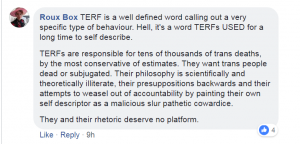At worst a slur and at best derogatory
A guest post at Daily Nous by Dr. Sophie Allen, Dr. Elizabeth Finneron-Burns, Dr. Jane Clare Jones, Dr. Holly Lawford-Smith, Dr. Mary Leng, Dr. Rebecca Reilly-Cooper, and Dr. Rebecca Simpson:
We write to register in public a complaint with a recent issue of Philosophy and Phenomenological Research (PPR). Two papers in this issue, the first by Rachel McKinnon and the second by Jason Stanley, used the term ‘TERF’, which is at worst a slur and at best derogatory. We are extremely concerned about the normalization of this term in academic philosophy, and its effect in reinforcing a hostile climate for debate on an issue of key importance to women…
“TERF” is widely used across online platforms as a way to denigrate and dismiss the women (and some men) who disagree with the dominant narrative on trans issues. The acronym stands for “Trans Exclusionary Radical Feminist”, and historically marked a difference within radical feminism. Although its usage is becoming ever broader, one of the groups it targets are lesbians who merely maintain that same-sex attraction is not equivalent to transphobia, another is women who believe that women’s oppression is sex-based, and are concerned about erasing the political importance of female bodies. Anyone who is in any doubt about the way this term is used should consult the following pages, which compile examples from Twitter and other online platforms: https://terfisaslur.com/, https://lesbian-rights-nz.org/shame-receipts/.
To put it in more demotic terms, “TERF” is political slang as opposed to technical language, and it’s also decidedly pejorative.
We’re aware, from recent Tweets of McKinnon’s and from other sources, that McKinnon’s paper was contested prior to publication, with people pointing out to PPR’s Editor Ernest Sosa that “TERF” is a slur and suggesting that a more neutral term, for example “gender critical feminists”, be substituted. Sosa and the other editors were given evidence of the offensiveness of the term; fielded complaints from the members of the groups it targets; and yet persisted in publishing the piece regardless.
Publishing the piece with “TERF” rather than a more neutral term. I find that astonishing.
In addition, the term “TERF” likely doesn’t refer to any existing person, but rather caricatures a wide range of feminist positions and gives opponents an easy way to pigeonhole and dismiss them. Gender critical and radical feminists are not an organized group and do not share a homogeneous set of opinions. The exposition that McKinnon gives of “TERF” beliefs is somewhat unclear, but includes, according to her, the belief that the inclusion of trans women in natal women-only spaces constitutes rape (p. 484), that trans women should be denied medical treatment or protection from discrimination (p. 486), and that trans women are sexual predators (p. 485) None of us hold these beliefs, but we have all been called “TERFs” online, some of us frequently, and indeed, one of us by McKinnon herself in a series of Tweets.
Which is exactly why it shouldn’t be used in an academic journal: it’s a blanket term thrown at anyone who questions or rejects any part of the trans activist dogma at the same time it is understood as covering all possible forms of rejection of that dogma including outright abuse and even violence.
Whether or not it’s a slur, it is undeniable that”‘TERF” is a term used to harass, shame, dismiss, and denigrate women’s ideas and opinions. The fact that PPR has printed two papers that both deploy, rather than merely discuss, this term is unacceptable. It sets a bad precedent for other journals, and it signals disrespect to members of a group that is already underrepresented in academic philosophy, namely women. The conventions of academic discourse demand that radical and gender critical feminists, like anyone else in our profession, be free to state their professional disagreements and be engaged with in a way that is courteous and respectful. Ad hominem attacks are neither, and there are legitimate concerns about normalizing a term which many women feel is instrumental in creating a hostile and intimidating climate in this debate, and is stifling academic discussion of this issue.
Updating to add one of the comments on the Daily Nous Facebook post:
Tens of thousands of trans deaths! At the hands of “TERFs”!
People have lost their fucking minds.
Updating to add one of the comments at Daily Nous:
“Cis women, as such, are most definitely NOT an oppressed class. Quite the contrary.”
You couldn’t make it up.



‘TERF’ is
In the sense that it has become a blanket response, it is being used as a cover for the simple fact that the TRAs have no coherent narrative to back up their one basic claim that a transwoman is a woman. So, in light of the fact that all behaviour of this kind is now specifically named (gaslighting, virtue signalling, etc.), and because TERF is used as a ready-made, artificial covering, might I suggest that the act of calling others a TERF is henceforth known as Astroterfing?
A section from one comment on that post:
Question: is a cis philosopher someone who actually has an advanced degree in philosophy in contrast to trans philosophers who just wear the hat?
I don’t get why it’s considered OK for genderists (or anyone else) to label other people as ‘cis’.
One can’t know that about another person – they must decide that for themselves.
I mean, I understand the reason *why* it’s mostly done, along with the use of ‘TERF’ – to tell women they are privileged over trans-identified people, and that they should STFUB about (actual) feminism or be assaulted as they deserve for being oppressive bigots.
Even putting aside, as intended, the needs and rights of boring, unspecial, uninsightful, unoriginal, fungible, privileged, oppressive cisterfs (women)…it seems to me that if you label someone else as ‘cis’ without their agreement or permission, you run the risk of performing all kinds of violence (as per genderist usage) towards some people who actually matter to the genderists- trans women who ‘pass’ but are not ‘out’.
Perhaps the free application of ‘cis’ to people who look like women is a tacit, unconscious reveal from the genderists of their level of belief that saying you are a woman actually makes you one.
A cis-philosopher was assigned philosopher at birth. A trans philosopher has come to realize their innate philosopher, and identifies as a philosopher.
So what does ‘cis’ actually mean? From Websters;
Well, definition 2 doesn’t help, neither does 3, and I doubt that they’re using definition 1, which taken as read would mean that ‘cis’ is a natural state at the molecular level. I’m sure they don’t mean to suggest that trans people require molecular change rather than some make up and a dress in order to become women.
So, why ‘cis’? Is it from the Latin, meaning ‘this side of’? The opposite of this, of course, is ‘trans’, meaning ‘the other side of’. Logical, but only if their intended meaning is that a transwoman is literally the opposite of a ciswoman, and what is the opposite of woman?
I don’t think they’ve thought it through at all.
The editor of the journal in question wrote a sniveling little reply in defense of the decision to publish the slurs and errors intact. It’s available just below Allen et al.’s post. So much for that rag.
That was an excellent letter, especially:
A direct shot against the passage “there’s never been a verified reported instance of a trans women [sic] sexually assaulting a cis woman in [sex segregated] spaces” – which also appears to be a No True Scotsman fallacy.
Also, the editor they were addressing posted a reply.
IANAP (I Am Not A Philosopher), but Gender Critical (GC) identifies a position, while TERF supposedly identifies a person (and is always used pejoratively). A philosopher using the word TERF is misdirecting attention from ideas to people, and those people are supposedly bad or wrong by definition. This is dismal philosophy.
Bam. Nailed it.